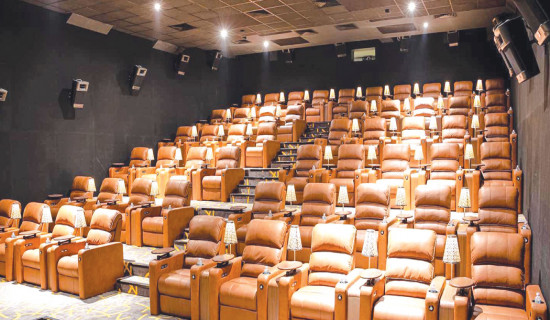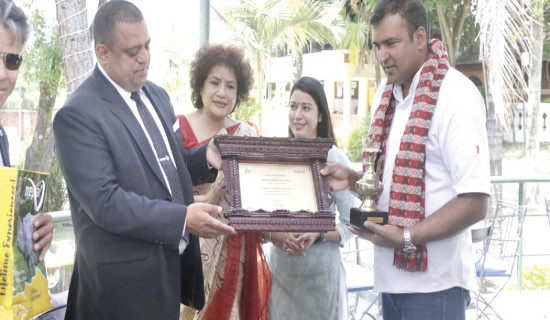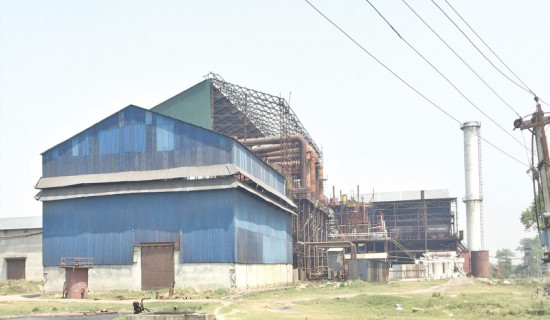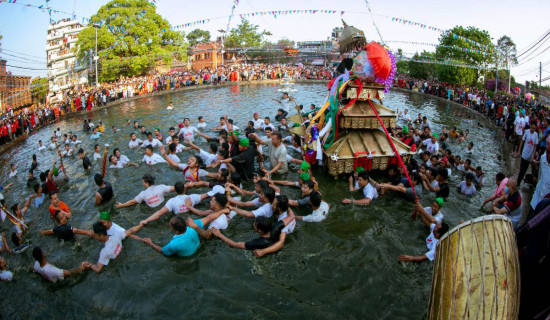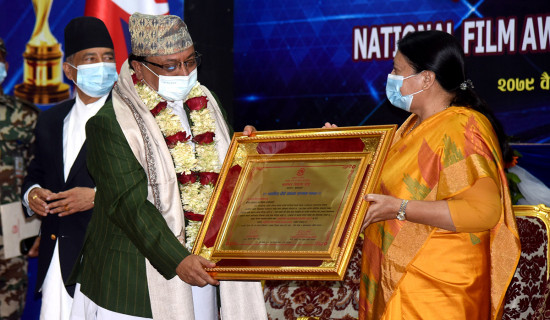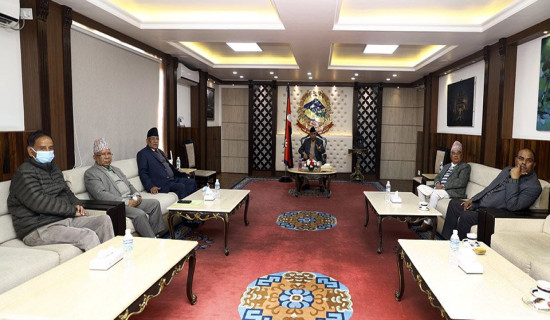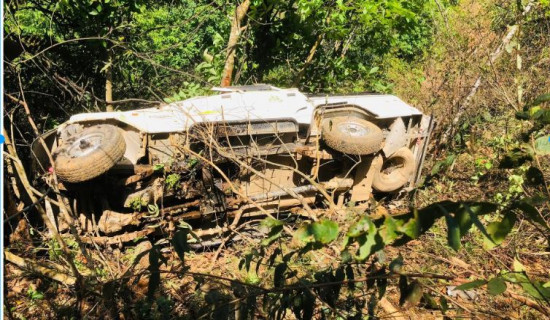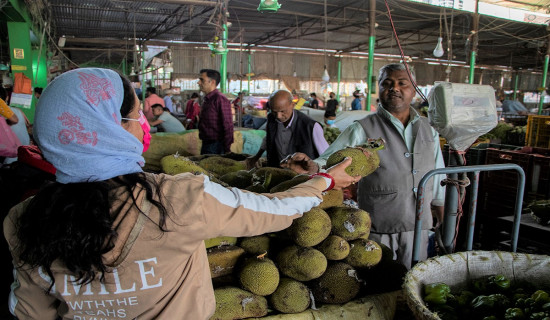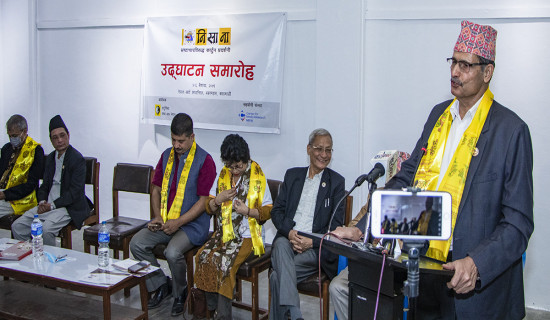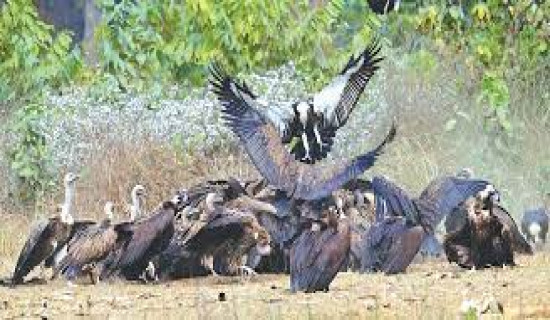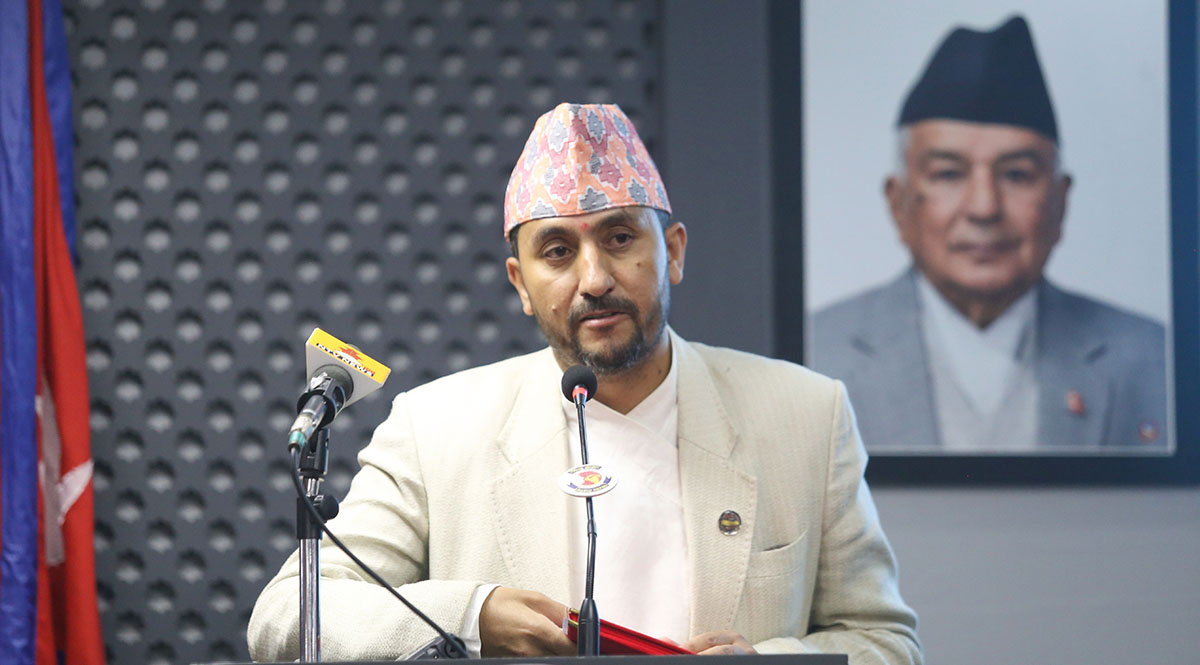- Monday, 29 September 2025
New multiplex comes into operation
By A Staff ReporterKathmandu, Apr 18 : A new multiplex has come into operation in the capital after the daily cases of COVID -19 declined to less than 20.When Kirtipur Cineplex, Ranjana Cineplex, Om, Namah and Shivaya cinemas of Gopi Krishna Movies have already been in operation after the lifting of the COVID -19 restrictions, Durbar Cinemax has come into operation at Durbar Mall of Durbar Marga. Ranjana Cineplex was closed for many years while Om, Namah and Shivaya cinemas were closed two years ago. QFX has managed Durbar Cinemax, owned by Guna Cinema Group that has been operating Guna Cinema Hall in Gwarko, Lalitpur, for the past two and a half decades.Durbar Cinemax has two halls with a capacity of 50 and 53 seats and equipped with sophisticated sound system, folding seats and screen. Managing Director of Durbar Cinemax Diprash Shakya informed that the audience can watch the movie as per their wish in the hall. Food and bar services are also available inside the hall.Managing Director Shakya said that the luxury hall has been brought into operation keeping in mind the interest, safety, quality technology and convenience of the audience.He informed that both the halls have come into operation by screening Nepali film A Mero Hajur-4 and South Indian film KGF Chapter–2.
Typhoid vaccination begins in Bajura
By Our Correspondent Bajura, Apr 18 : Administering vaccine against typhoid has begun in Bajura from Sunday under the government’s nationwide vaccination campaign. Under the three-week nationwide campaign, all children aged between 15 months and 15 years are receiving the jab. The nationwide campaign aims to achieve wider protection from typhoid, increase the impact of the vaccine introduction and combat the rise of antimicrobial resistance. Around 58,000 children from all the nine local levels will be inoculated the typhoid vaccine. The campaign will be conducted from April 17 to April 21 from 348 vaccination centres of the district. According to the Health Office (DHO) Bajura, 348 health workers and more than 600 volunteers have been mobilised for the vaccination campaign. The district is administering the vaccine against typhoid for the first time. The DHO has requested all the targeted children to reach the nearest vaccination centres and receive the jab.“We received the vaccine today and started the campaign,” said Daya Krishna Panta, chief at DHO, Bajura. On April 7, the government launched the vaccine campaign introducing Typhoid Conjugate Vaccine (TCV) into the routine immunisation programme across the nation.
Tourism Board honours BBC Master Chef's team
By A Staff ReporterKathmandu, Apr 18 : Nepal Tourism Board (NTB) on Sunday honored the finalists of BBC Master Chef: The Professional 2020. In a program organized in Kathmandu, the team of chefs including Alex Wave, Alex Wave, Bart van der Lee, and Philli Armitage along with Master Chef Santosh Shah was received by the Chief Executive Officer of the Board, Dr. Dhananjay Regmi as well as board members and directors.Dr. Regmi said that Shah has added a new dimension to Nepal's tourism by introducing Nepali cuisine to the world. "Nepal is considered as a beautiful destination by tourists but after Master Chef Santosh Shah introduced Nepali food to the world, it conveyed the message that Nepal is also an important destination in terms of culinary tourism,” he said. Shah said that he was proud to bring Nepali food to the world stage. He also urged the team that came with him to come back to Nepal and experience Nepal up close again. Similarly, Wave, Lee, and Armitage said that they were happy to visit Nepal and learn about the art and culture here. Nepal's tourism sector was devastated by the COVID-19 pandemic but is slowly returning to normalcy. A team of Chefs including Shah has been in Nepal since April 7 during the 'Master Chef Finalist Tour to Nepal' tour program organised by the Nepal Chapter of Pacific Asia Travel Association (PATA) under the promotion of the post-epidemic tourism revival campaign promoted by NTB.
Farmers halt sugar supply
By Our CorrespondentSarlahi, Apr 18 : The farmers of Sarlahi have halted the supply of sugar from Mahalaxmi Sugar Factory in Bagdaha of Godaita Municipality.The farmers hadn't been paid for the sugarcane for two months even though sugar was being sold in the market which made the angry farmers block the supply. The farmers insisted that they wouldn't allow the supply unless their dues are paid.The farmers have stopped three trucks – State 2-03-001 Kha 3057, Na 6 Kha 2173, and Na 5 Kha 7387 – from the factory which was bound for Kathmandu with sugar. Due to obstruction from the farmers, the trucks were unloaded in the factory's storehouse.Sugarcane farmer Ram Dinesh Yadav said they had to protest because the factory didn't pay them. "The factory had earlier promised to pay the sugarcane dues in cash. Now, they have started selling sugar in the market but haven’t paid us our money," said Yadav.Mahalaxmi Sugar Factory crushed 890,000 quintals of sugarcane this year before being closed on March 3. The factory still has Rs. 1.8 million in dues to pay the farmers.The factory insisted that it was paying the farmers. The owner of Mahalaxmi Sugar Factory Birendra Kanodia said, "About 90 percent of farmers are already paid and the remaining amount will also be paid gradually.”Industrialist Kanodia said a few agents were causing unwanted trouble in the factory in the name of the farmers. Among the three sugar factories of Sarlahi, there was no complaint regarding payment from Indushankar Sugar Factory of Harrison and Annapurna Sugar Factory of Dhankaul.The sugarcane farmers said they have not been given government grants this year as well. The sugarcane farmers seem agitated after not being paid in time by the factory and the government.
Electoral Alliance
As the country is heading towards the local polls slated for May 13, electoral alliances among the political parties have become a defining characteristic of contemporary politics. Both ruling and opposition parties have forged alliances with like-minded forces. The constituents of the current five-party coalition – Nepali Congress (NC), CPN-Maoist Centre, CPN-Unified Socialist, Janata Samajbadi Party (JSP) and Rashtriya Janamorcha – have decided to go together in all three-tier polls. Similarly, the main opposition CPN-UML has recently struck a deal with Rashtriya Prajatantra Party-Nepal and Pariwar Dal to jointly contest the upcoming local elections. It is natural in the democratic setup for the parties to ally with their compatible counterparts to muster more seats in the polls. Nonetheless, the political parties are expected to respect the basic norms and values of democracy while entering the poll alliance. Ideological coherence, constitutional spirit and political ethics must not be undermined. If the parties forge unnatural alliances, guided by parochial interest and political vendetta, this will hurt democratic culture and the prospects of consolidating the democratic republic through the periodic poll which is a crucial democratic exercise. The ruling coalition came to power with a commitment to safeguarding the republican constitution and federal parliament. It has fought together to save the parliamentary sanctity. It has an august duty to ensure institutionalization of democracy, implementation of the constitution, and safeguarding the hard system from derailing and coming under threat. The reinstatement of the parliament and formation of a coalition government as per the historic verdict of the Supreme Court did not only bring the constitution back on track but also averted the possibility of plunging the nation into another vicious cycle of instability. This is a reason that coalition partners have decided to continue supporting each other in the upcoming local level elections by shelving their differences. Last week, issuing a joint statement, the top leaders of the ruling coalition urged all their leaders and cadres to work out an electoral alliance framework and move ahead with a spirit of mutual collaboration and cooperation. The ruling coalition insists that it needs solidarity to protect the nation and democracy from the anti-change and regressive forces while protecting Nepal’s sovereignty, independence, people’s freedom and progress. No doubt, the coalition will be able to ensure stability, inclusive democracy and desired prosperity if they translate their pledge into action.For this, they should secure people’s robust mandate. This requires them to support each other in the polls without conditions and by sorting out the dissatisfaction of the grassroots cadres. Political honesty is necessary to make sure that the candidates receive public support and get elected in the elections. Against this backdrop, Prime Minister and Nepali Congress President Sher Bahadur Deuba has said that his party would not betray the ruling parties’ decision to forge the electoral alliance in the upcoming local polls. PM Deuba has not mince words when he said that he became the PM with the support of the coalition parties. As the largest ruling partner, NC has an important responsibility to implement the decisions of the high-level political mechanism with regard to the poll alliance. PM Deuba’s commitment to supporting the coalition parties in the election will create an atmosphere of confidence and cooperation among the allies, thereby living up to the values of public morality and trust in politics.
Correct Information Key To Fair Polls
Ballav Dahal, Free, impartial, and responsible media is one of the pillars of democracy as it enables people to make informed decisions during elections. Voters can elect honest, committed, capable and visionary leaders as their representatives only when the former is well-informed about the parties and their candidates. There is no denying the fact that disseminating the right information at the right time through proper channels is required for empowering people to vote for the deserving candidates. When such representatives come to power, they could emerge as a change-maker by working as per the needs and aspirations of the common masses. As Nepal is preparing for the second local elections on May 13 this year after the creation of the federal system of governance, the Election Commission (EC), other government bodies, and political parties have an important role to play in circulating all the electoral information in a more effective manner. Even amidst a rising literacy rate in the country, many people can still easily be misled by the spread of fake and distorted information. Curbing fake message Participants in the interaction on ‘Transmission of the Right Information in the Electoral Process’, which was organized by the National Information Commission recently, expressed the same concern. They emphasized the need for the government and the election body to remain vigilant against the possible dissemination of misinformation, disinformation, and mal-information and step up prompt measures accordingly. The dissemination of the false messages is likely to misinform voters, which, in turn, could lead to the election of the wrong candidates. Thus, the spread of the proper information on time is vital for strengthening democracy. Only dedicated and visionary representatives could help deal with all the pertinent problems facing people and expedite the process of overall development at the local levels. With the advancement of digital technology, there has been a growing use of social media platforms for disseminating electoral information worldwide. As people in Nepal have also better access to the internet, such social media platforms could be of immense use for spreading the poll information. Those sites could be relatively cheap and efficient to disseminate election-related information and mobilize voters. Such sites facilitate candidates to better reach out to their voters and engage them in the poll campaigns. Since social media sites have turned out to be an important part of our day-to-day life, they could be used as the key channels for canvassing. But such platforms need to be monitored properly in view of the higher chances of the fake information being transmitted. It is needless to mention that false information travels faster than the truth. The spread of such information may be detrimental to a free and fair election. The use of social media sites can cause misrepresentation of accurate voter information in regard to voting methods, location and time. There are also chances of voter frauds, provocation for violence and spreading of hate speech. Another possible risk is related to online harassment of women candidates. Taking all this into serious consideration, the EC seems to have remained watchful against the probable misuse of social media during the local polls. Local elections are very significant in the sense that they contribute to strengthening the grassroots democracy. The Constitution of Nepal, 2015 upholds the importance of the local government, which is directly associated with the people. So, the local government institutions are considered the foundation of democracy. It can be easier for the state mechanisms to take the benefits of democracy to the people when the local government is vibrant and capable enough to carry out its responsibilities well. The formation of a responsible, accountable and transparent local government is possible only through fair elections. With increasing security threats, conducting such polls is quite challenging.What is another worrisome matter is that the country has witnessed a considerable increase in election expenses over the years. Even several top leaders belonging to different political parties have realized this. If this type of unwelcome trend continues, all the elections — be it local, provincial or federal — may become so expensive that only well-off candidates could afford to contest them. When money becomes dominant in elections, it can create a lot of political anomalies. Poll codeTo check such problems, the EC has fixed a ceiling of expenses for those vying for different positions of the local government such as mayor, deputy mayor, ward chairpersons, and ward members (in metropolis, sub-metropolis, and municipalities) and chairman, deputy chairperson, war chairperson and ward members (in rural municipalities). The election body has also implemented a code of conduct for the political parties and the concerned candidates when it comes to poll expenses and other election-related activities. In addition, the EC’s poll code comes into effect even for the government, its ministers, public institutions, local levels, poll observers, civil servants, security agencies, media outlets, and those holding public positions. As part of the election process, the code of conduct, if followed strictly, could be helpful for holding the upcoming local polls in a free, fair, and fearless environment. The EC needs to ensure that all the stakeholders abide by the code of conduct in letter and spirit in order to perform its important responsibility of conducting the local polls in a dignified manner. Only then can genuine representatives make it to the local government institutions.(Dahal is Deputy Executive Editor of this daily.ballav.dahal@gmail.com)
Looming Food Crisis
Claudia Isabel RittelRussia’s attack on Ukraine will have considerable impacts on global food security. The two countries account for about 30 percent of international cereal exports. Reduced supply may mean famine for millions of people.In normal times, Ukrainian farmers spend the first two weeks in March working hard to ensure a good harvest later in the year. This time, many did not fertilize fields. Instead, they were fighting to protect their country or had fled. Apart from Ukrainians, millions of people around the world will thus suffer an impact of the war. Ukraine has basically stopped exporting wheat. The ports are no longer operational, and many companies have closed down. Russian grain exports, moreover, have also been reduced considerably, though food is excluded from the sanctions that were imposed on Russia in March. However, professional observers report that international traders have voluntarily discontinued their Russian business. Compounding matters, Russia has declared it will stop grain exports. Global wheat prices have thus increased fast, from a comparatively high base.To some extent, higher energy costs are driving that trend too, says Christine Chemnitz, an agriculture analyst who works for the Heinrich-Böll-Foundation, which is close to Germany’s Green party. Other relevant issues include uncertainty about future harvests and more expensive insurance premiums for freight ships navigating the Black Sea.Chemnitz says that the speculation on commodity exchanges so far has not had a major impact, while Chinese imports have made a difference. The People’s Republic has been buying huge volumes for a while and started importing wheat from Russia on 24 February, according to the news agency AP. That was the very day Russian troops invaded Ukraine. Christof Buchholz, the executive of an umbrella organization of cereal traders in Hamburg, states that global trade patterns are changing dramatically. Some observers believe that China may be storing cereals for geostrategic purposes.Martin Rentsch of the World Food Programme (WFP) warns that some countries will be unable to cope with higher prices and thus face serious consequences. He points out, for example, that wheat is the second most important staple food in Kenya, where local producers only supply about 10 percent of what consumers buy. The scenario is similar in other African and Asian countries. According to the UN Food and Agriculture Organisation (FAO), up to an additional 13 million people may now suffer from hunger. In the medium term, higher prices will affect the WFP, which provides food to people in crisis regions around the world. Its stores are currently full, Rentsch says, but higher prices mean the agency will not be able to buy as much as planned in the future unless its funding is increased. The tough choice will then be to either serve fewer people in humanitarian need or to reduce individual portions. The worst scenario would be having to cut hungry persons’ rations in order to save others from starvation.At this point, it is impossible to assess what global supply will look like in the coming months. Open questions include to what extent Ukrainian farmers can sow wheat now and harvest in the summer. -Development And Cooperation
Festival of onrnament searching in pond (photo feature)
It is said that the tradition of searching for ornaments in the pond of Tundaldevi (Vaishnavi) started during the reign of King Mandev during the Lichchavi era in Nepal. It is said that the ornaments of Tundaldevi were lost in the pond.
11 new cases, 36 recoveries in 24 hours
In 2,750 Real-Time Polymerase Chain Reaction (RT-PCR) tests done in the past 24 hours, a total of 11 people were found infected with SARS-CoV-2, informed the Ministry of Health and Population (MoHP) in its regular update.
President Bhandari felicitates artist with various honours
Senior artist Bhuwan Thapa Chand and senior musician Shambhujeet Baskota were felicitated with the long service honour.
Discussion on local elections in ruling coalition meeting
Top leaders of the ruling coalition held a discussion on Sunday morning.
Police ascertain identity of all five people killed in Waling
The identities of five people who died in a jeep accident in Waling, Syangja have been revealed.
Indian jackfruit in Nepali market (Photo Feature)
Jackfruit does not get ripened in Nepal in this season but in the market, there are a lot of jackfruits. Jackfruits imported from the neighbouring country India has been flooding the Nepali vegetable market for a month now as the fruit is also used for making a curry.
Corruption would imperil country if not curbed: Speaker Sapkota
Speaker of the House of Representatives (HoR) Agni Prasad Sapkota has called for a collective resolution to curb the continuously increasing corruption in the country, warning that it would imperil the country if not controlled.
Vulture breeding centre at CNP to close down
The vulture breeding centre at Chitwan National Park (CNP) is to shut down. The centre established in 2008 is closing down in view of the increasing number of vultures in the wild and the breeding not becoming impactful at the centre, the park officials said.


